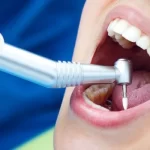Are you brushing daily? Even after brushing your teeth twice a day, you see the unsightly plaque and tartar build-up between the teeth and sometimes on the gums. The ugly build-up is an obvious sign that you are not taking good care of your teeth. So, what went wrong. You are following a rigorous regime of brushing and still facing these issues! Well, the culprit is tooth decay and the underlying reason for this is that you are not flossing the teeth. Maybe you are not aware of the benefits or don’t know how to floss your teeth? Don’t worry, we have got you covered.

What is dental floss and why should you do it?
Generally, we brush to get our teeth cleaned. However, it’s not the only method to maintain oral hygiene. Sometimes smaller food particles get stuck at the tiny gaps between the teeth and cause dental issues. To overcome the problem, you can try flossing your teeth.
The easiest method of interdental cleaning is known as flossing. In which, you take thin strands of nylon which are twisted so closely to clean the tiniest gaps between your teeth. Many people think that dental floss is an optional step of their oral hygiene routine. However, dentists recommend it doing twice a day on a regular basis because it has a lot of benefits, such as:
- It prevents tartar build-up: Plaque and tartar build-up are stubborn things that when left untreated can harm the tooth enamel. The bacteria in plaque is the biggest enemy of your tooth enamel. When the plaque is hardened, it turns into ugly tartar that is tough to remove. To prevent reaching that stage and to protect your teeth, you can start cleaning the food and sticky particles from getting stuck between the teeth with flossing.
- It prevents bad breath: The food which is stuck between the teeth and the gumline leads to bacterial growth, which eventually causes bad breath in our mouths. To prevent this, the most effective way of cleaning is floss.
- It improves your gum health: The plaque and tartar build-up not just looks bad but causes serious infection and inflammation problems for the gum. To prevent gum diseases in future, it is beneficial to make flossing a regular habit.
- Fewer chances of developing cavities: The food which is hidden at tiny spots inside your mouth can even cause cavities over time. Although when you floss regularly, you make sure that your oral hygiene is maintained and there will be fewer chances of developing cavities.
- It’s the best preventive oral health care: Overall, flossing should not be seen as an optional method for dental hygiene. Following it regularly prevents you from so many serious dental issues like stained, damaged or decayed teeth.
How to floss your teeth correctly?
Flossing the proper way is important, otherwise, you will end up hurting your teeth and gums. The idea is to break around 18 inches of the thread and then wrap it on the middle fingers of both your hands. Keep the thread taut and use a gentle rubbing motion to clean the tiny gaps between the teeth. Be careful as you reach the gum, otherwise, you will feel pain or maybe bleeding. Repeat the step for every tooth and then discard the floss, you should use a floss thread only once.
How to floss with braces?
Flossing can be a bit challenging and time consuming when you have braces. It is recommended to use waxed floss which is less likely to tear from your braces. Begin by threading the teeth and the main wire with floss and then use the loose ends to twist around your fingers to continue flossing. Repeat the same method but make sure to prevent the floss from popping, otherwise, the braces wire could be removed.
How often should you floss?
It is recommended to floss your teeth at least once a day. Some people prefer to do it in the morning, while others like to go to bed after a flossing routine. Whenever you feel comfortable you can floss your teeth, but make sure it is followed by a brushing routine for effective cleaning.
Final word
Oral hygiene should be the top priority of every individual. To reduce the chances of tooth decay and gum infections, it is good to know how to floss. Along with brushing and flossing, it is recommended to visit your dentists regularly for professional cleaning. If interested in maintaining good oral hygiene, consider getting in touch with Roseland Dental.




